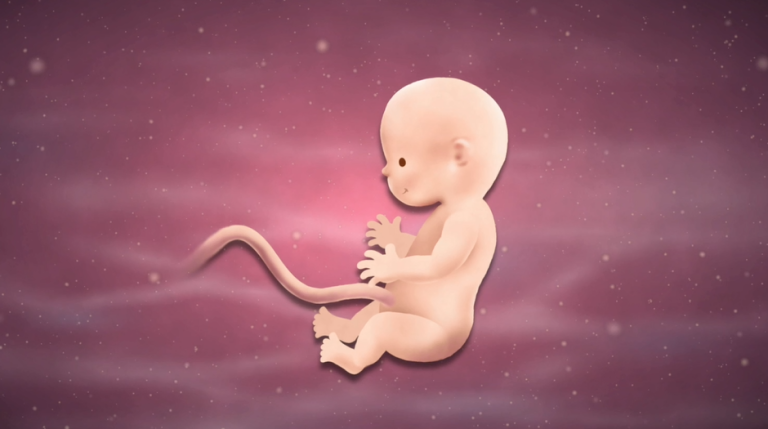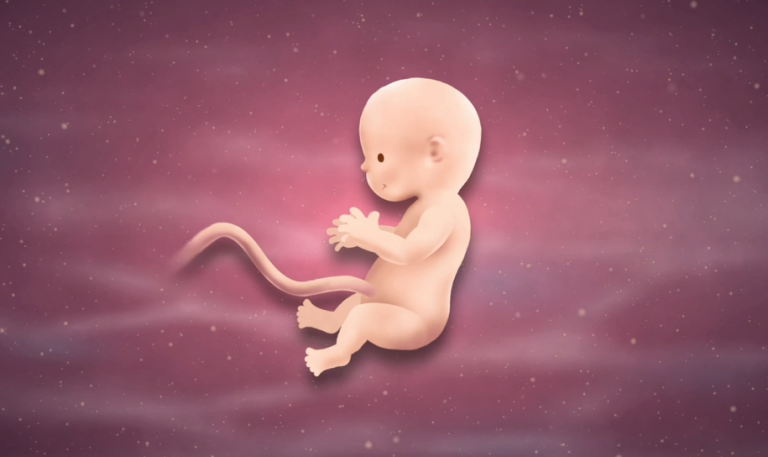Time passes quickly, and you have arrived at the eleventh week of your pregnancy. In this exciting period, your baby rapidly develops, and your body changes accordingly. Let’s look at these rapid shifts in detail.
Your Baby at Eleven Weeks
A week passes in the blink of an eye. At the same time, your baby undergoes many changes in one week.
How Big is Your Baby at Eleven Weeks?
Whenever you have your check-up, you undoubtedly wonder, “How much has my baby grown?” As development continues at full speed, your baby’s length and weight increase equally quickly. He has now reached the size of a lime.
You can find the average foetal length and weight in the table below. These values are averages and may vary from baby to baby due to differences in the moment of fertilisation, which cannot exactly be determined. If fertilisation occurred later than expected, your baby’s values might be lower. Only your doctor can tell you whether there is cause for concern or not.
| Gestational Age | Weight | Length |
| 11th week | 7-8 g | 4-6 cm |
Development of the Organ Systems and Skills
Your baby, who has become a foetus, grows and develops steadily. As the number of cells increases, the tissues develop and the organs mature. Let’s look at the current development of the organs and related systems in an eleven-week-old foetus in the womb.
- The Nervous System
On your baby’s ultrasound images, you’ll see the skull forming. This provides the necessary space for the brain to function. By the eleventh week of pregnancy, you will notice that your baby’s facial bones change significantly. The jaw is separated from the chest, and the tooth buds that started to form in the previous week gradually fill up the entire jawbone. Your baby’s swallowing reflex has developed, and he has begun to swallow amniotic fluid.
- The Circulatory System
The yolk sac, which has surrounded the baby from the first moment of conception, gradually began to disappear in the previous weeks, and the placenta took over its functions. Now the placenta is your baby’s life support. In addition, the umbilical cord, with its three veins wrapped around it, fulfils the task of providing blood flow between the mother and baby. It also allows the baby to move freely in the amniotic fluid.
The foetus’s small heart beats faster than that of an adult. As the heart matures, the heart rate decreases. This week, your baby’s heart rate will be around 160 beats per minute.
- The Digestive System
The intestines settle into place in the abdominal cavity. Last week, your baby’s kidneys started to function to filter the swallowed amniotic fluid and produce urine. This process continues throughout pregnancy.
- The Respiratory System
The placenta, your baby’s life support unit, is important for his oxygen supply, nutrition, and waste disposal. It takes a great deal of energy to perform all these tasks.
Your baby’s diaphragm is further developing. This large muscle will activate your baby’s breathing mechanism in the period.
- The Musculoskeletal System
Your little one’s bones and muscles continue to develop, and he has now started moving. By the eleventh week, his fingers are moving well, and they can even grasp the umbilical cord. As the skeletal system develops, the muscles and joints gradually get stronger.
- The Urinary System
The kidneys, which started producing urine the previous week, continue to work. They will speed up their activities when the intestines settle in place.
- The Reproductive System
We know that you are eagerly waiting to learn the gender of your baby. Every time you go for a check-up, you wonder, “Will we be able to determine the gender now?” And yes, your baby’s reproductive organs acquire their male or female characteristics this week. However, it is not possible to see this on ultrasound yet. You will have to wait a little longer to find out the gender.
- The Endocrine and Immune System
Although your baby’s hormone glands are slowly developing, they are not strong enough to form the immune system. Instead, the amniotic fluid continues to protect your baby from outside attacks.
Your Baby’s Movements at Eleven Weeks
You have been looking forward to the day you will feel your baby’s movements from the first moment of your pregnancy. But because he is still so small, you cannot feel it yet. Fortunately, ultrasound tells you otherwise: your baby is clearly moving in your womb.
An Eleven-Week-Old Foetus’s Sense Organs
As your baby’s brain develops, so do the sense organs it controls. While the eyes, nose, ears, skin, and tongue gradually complete their development in the eleventh week of pregnancy, some sense organs start to function. Let’s look at how your baby’s sense organs progress.
- The Eyes and the Sense of Sight
Even though your baby’s eyelids are still closed, the development of the eye lenses and eyelids is completed in the eleventh week. However, small changes, such as the location of the eyes in the face, will take place until birth. The alternation of sleep and wakefulness that started in the tenth week also continues.
- The Ears and the Sense of Hearing
While the development of your baby’s earlobes and auricles continues, the ears slowly find their place and shape. However, the foetus is not hearing yet.
- The Skin and the Sense of Touch
The foetus’s transparent skin has almost reached completion. The sense of touch starts functioning this week. If you press your stomach, your baby will move to the other side, even though you won’t feel it. Your baby’s hands will also start to feel, and he will touch and grasp the umbilical cord with his extended fingers. Also, hair follicles are gradually forming on the skin and crown of the head.
- The Nose and the Sense of Smell
The nose is one of the first organs to become apparent on your baby’s skull. When you look at the ultrasound image, you can see that the facial features and nose have developed. The eleventh week is also the moment when the olfactory receptors in the nose develop. In other words, an eleven-week-old foetus begins to smell the amniotic fluid he is in.
- The Tongue and the Sense of Taste
The sense of taste develops along with the sense of smell. So, your baby not only smells the amniotic fluid he is in, but he also tastes it. Due to the contractions of his diaphragm, your baby also starts hiccupping, but it’s still too early to feel this.
How Many Months is Your baby at Eleven Weeks?
Pregnancy is a period of nine months and ten days, corresponding to forty weeks. Although we are used to expressing this period in months, your doctor will talk about weeks. So, how can you convert the number of weeks into months? Let’s calculate this together:
1 week = 7 days; 1 month = 30 days
11 weeks = 11×7 = 77
77/30 = 2 months 17 days
Considering this calculation, we can say that your baby is approximately two months and 17 days old. So you’ve already left 2.5 months behind.
Your Body at Eleven Weeks of Pregnancy
As your baby develops, your body and emotions undergo changes. What kind of changes can you expect at eleven weeks of pregnancy?
- Weight gain
Weight gain is one of the most obvious physical changes at eleven weeks of pregnancy. However, excessive weight gain is not recommended in the first two to three months. As the foetus is still very small, the speed of weight gain will increase in the following months. Therefore, it is important to keep it under control in the first few months. At eleven weeks, you shouldn’t have gained more than two to two-and-a-half kilograms since the beginning of pregnancy.
- The expansion of your uterus
At eleven weeks, your uterus is the size of a medium grapefruit. In the previous weeks, the pressure of your uterus on your bladder caused an increased urge to urinate. However, this week, this pressure decreases as your uterus moves towards your abdominal cavity. As your uterus grows, your lateral ligaments are stretched, and you may start experiencing some muscle and joint aches.
- Waking up hungry in the morning
By the eleventh week, your morning sickness may begin to decrease, and you may start waking up hungry. An increased appetite doesn’t mean you need to eat for two, however, as you need to keep your weight under control.
- Constipation
Even if your nausea subsides at eleven weeks, you may develop other digestive issues. The pregnancy hormone progestin relaxes your muscles and slows down your digestive system. This allows nutrients to be transferred to your baby more efficiently. At the same time, this may cause constipation, heartburn, bloating, gas, and burping.
- Belly expansion
This week your lower abdomen gradually starts to grow. A small bulge becomes visible as if you’ve eaten too much.
- Dry or oily skin
Pregnancy is a period when you need to make changes to your skincare routine. One thing many expectant mothers worry about is stretch marks. At eleven weeks, you may experience excessive dryness or oiliness of your skin. To prevent this, you will need suitable skincare products. Oils and moisturisers can help to avoid dry or cracking skin. Taking care of your skin regularly will visibly benefit you after birth.
Tips to Minimise Troublesome Pregnancy Symptoms
You have left a challenging period of pregnancy behind now. Some symptoms may still disturb you, however. Below, you can find some advice on how to minimise them.
- Now that the riskiest period is behind you, you can talk to other moms about their experiences. Your mom may be your biggest supporter. Share your troubles with her and show her you appreciate her help and support.
- Both pregnancy hormones and iron supplementation may cause constipation. To prevent this, consume fibre-rich foods such as dried fruits, legumes, plenty of vegetables, and leafy greens. This will also support you in keeping your weight under control. As fibre-rich foods may cause gas and bloating, eating small portions at regular intervals is best. Consuming plenty of water and fluids will also help combat constipation.
- For the proper absorption of your iron supplement, you should leave an adequate amount of time between taking your iron supplement and consuming calcium-rich foods or medicines. Ask your doctor or pharmacist for advice.
- You may feel more energetic compared to the previous weeks but resting whenever possible is still a good idea.
How Much Weight Should You Gain?
Since your baby remains very small during the first trimester, and your weight will rapidly increase as it grows, you should limit your weight gain now. Try not to gain more than 2-2.5 kilograms by eleven weeks.
Nutritional Recommendations at Eleven Weeks of Pregnancy
Your baby is growing quickly now. The foods you consume reach your baby via the placenta, which is about to complete its development. Therefore, you should pay great attention to what you eat. Below, we list some nutritional recommendations for eleven weeks of pregnancy:
- As your constipation may increase, you should consume fibre-rich foods. In addition, adequate fluid consumption will help with constipation, bloating, and gas.
- Make sure that the foods you eat are safe and comforting. Avoid foods such as undercooked meat or eggs, unwashed, raw vegetables, and unpasteurised cheese.
- Consume foods rich in folate and iron, such as dried figs, spring onions, and artichokes. Also, remember to consume fresh seafood and fish, rich in Omega-3.
- As your baby’s development is accelerating, calcium-rich foods will benefit his growing and developing bones. Dairy products, nuts, seeds, pulses, spinach, and figs are rich in calcium.
- Be careful about caffeine consumption and consume less than 300 mg daily.
Exercise Recommendations at Eleven Months
Pregnancy shouldn’t get in the way of exercising or being active. Pregnancy exercises, Pilates or yoga and light-paced walking are ideal. If you work sitting all day long, getting up and moving regularly is important for you and your baby to stimulate your blood circulation.
Eleven-Weeks-Pregnancy Checklist
- From the eleventh until the fourteenth week, you can have the nuchal translucency test to detect certain common foetal abnormalities. This test gives an indication but not a definitive diagnosis.
- In addition, you can have a detailed ultrasound this week.
- Now is the time to start learning about the postpartum period, breastfeeding, and newborn care. You can read books on this subject or ask experienced women for help.







